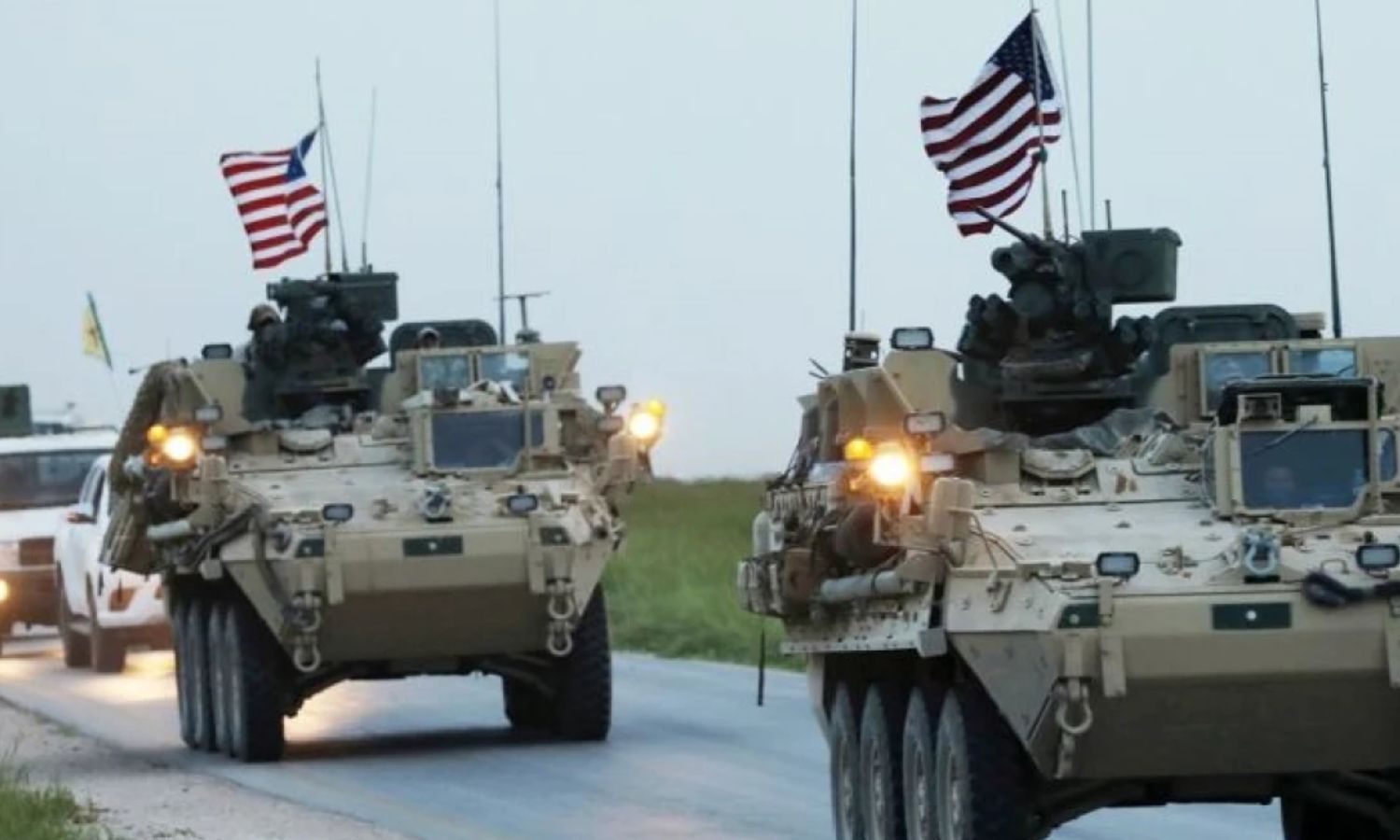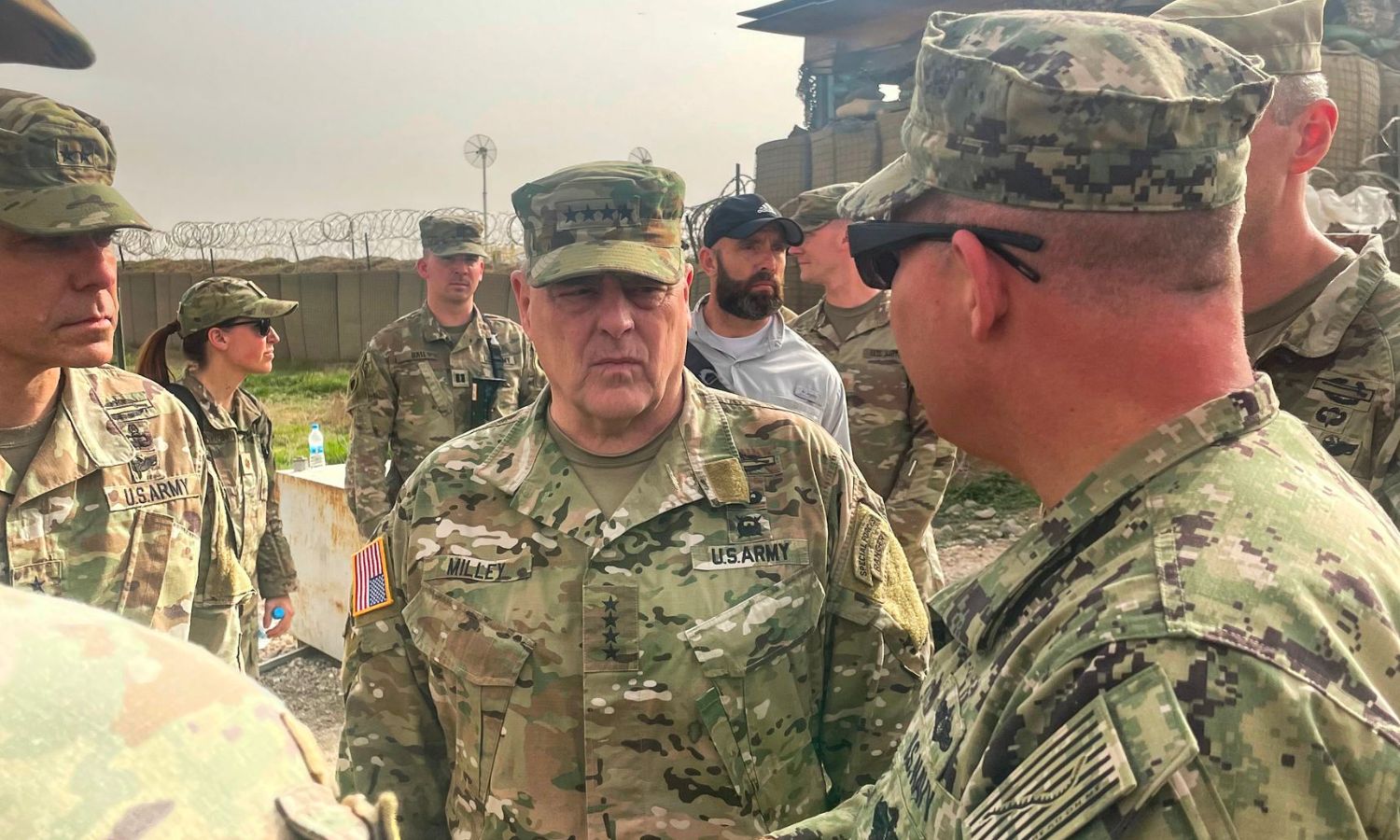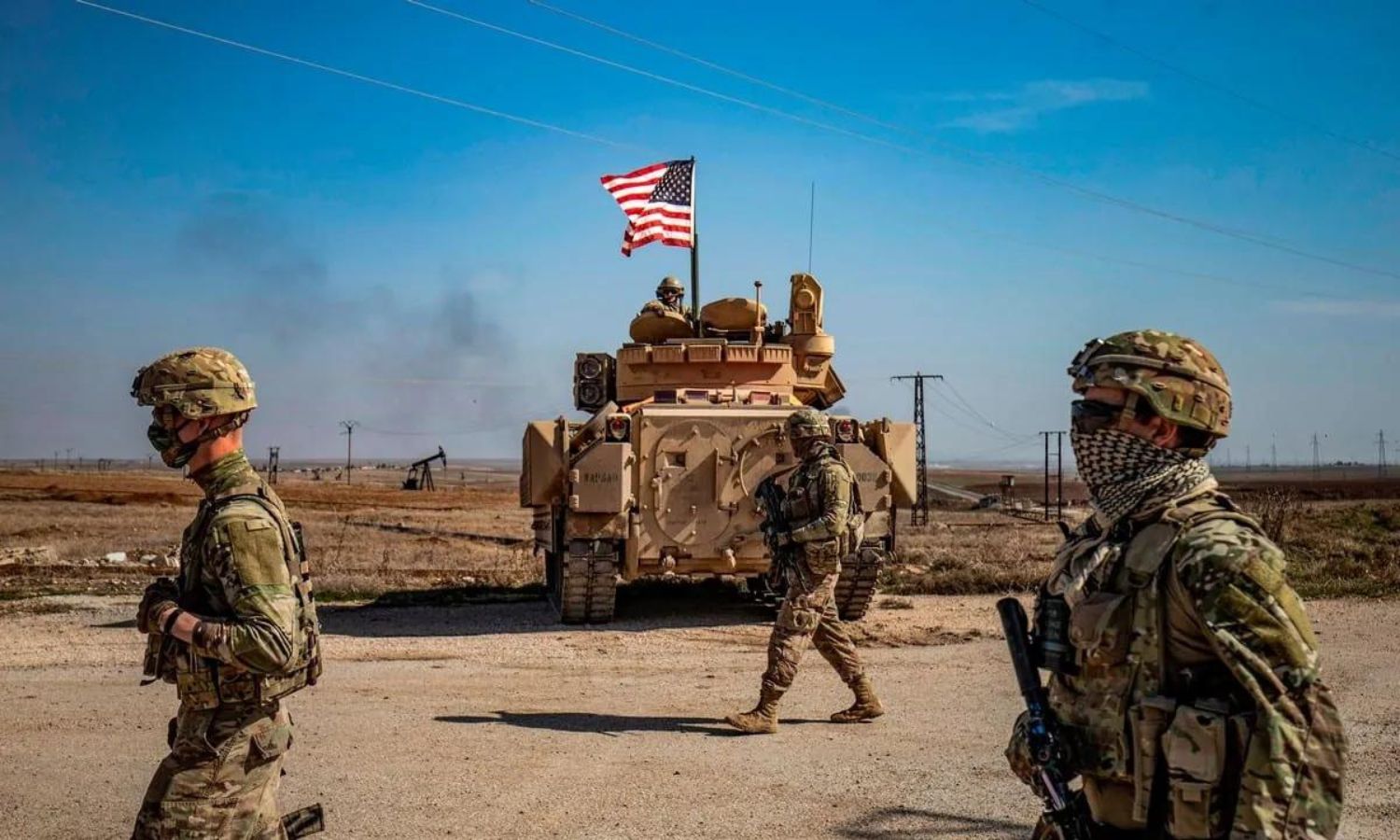



Enab Baladi – Muhammed Fansa
Iranian escalation against US bases in Syria has been witnessed in the past weeks, and despite the US calm to avoid escalation, there are calls for the US to withdraw its forces from Syrian territory.
These calls are represented by internal pressures through a draft resolution calling on the US President, Joe Biden, to withdraw US forces from Syria. It was put forward by a member of the US House of Representatives on February 22, but the result of the vote on the resolution failed, as the majority of representatives voted against it on March 8.
Before the vote, Republican Representative Matt Gaetz, who introduced the bill, said, “We must end the war in Syria and bring our troops home,” adding, “I do not believe what stands between a caliphate and not a caliphate are the 900 Americans who have been sent to this hellscape with no definition of victory, no clear objective.”
“Congress has never authorized the use of military force in Syria,” Gaetz said in a statement upon introducing the bill in February. “The United States is currently not in a war with or against Syria, so why are we conducting dangerous military operations there? President Joe Biden must remove all US armed forces from Syria.”
The United States has about 900 soldiers in Syria, with the aim of fighting the Islamic State (IS) group while supporting the Syrian Democratic Forces (SDF), according to the statements of its officials, while Gaetz argues by saying that Congress has never authorized the participation of American forces in Syria, but that is required under the US Constitution.
On March 27, the US Senate voted overwhelmingly to advance legislation to revoke two 20-year-old authorizations for the invasion of Iraq, as Congress seeks to reassert its role in making the decision to send US forces to fight.
In statements in response to the draft resolution, the Chairman of the Joint Chiefs of Staff in the US Army, General Mark Milley, stressed, during an unpublicized visit by a military official of this level to an American base in Syria, that the American forces should remain in the region to confront IS.
Before his arrival on the Syrian lands, on March 4, Milley said during his tour in Europe and the Middle East that “the Syrian mission, which began more than eight years ago, is still very important.”

Chairman of the US Joint Chiefs of Staff General Mark Milley at a logistics base in northeastern Syria – March 4, 2023 (The Wall Street Journal/Gordon Leopold)
The external pressures calling for the US withdrawal from Syria are concentrated in the statements of regional and active countries in the Syrian file, such as Turkey, Russia, China, and Iran, and through the attacks of Iranian-backed militias on the US bases and finally the increasing Russian provocations to these bases.
The Iranian-backed attacks affect the American street, especially when they result in deaths or injuries among the American forces or contracted American citizens, which is what US Representative Matt Gaetz based his draft resolution on.
On March 23, an American civilian contractor was killed, and 12 other Americans were wounded at a US base in northeastern Syria in a drone strike, which US officials said was “Iranian.”
On the same day, two American “F-15 E” fighter jets launched from an American base in Qatar responded to the attack by launching airstrikes on militia sites linked to the Iranian Revolutionary Guard (IRG), which prompted the latter to launch a missile attack via drones the next day, resulting in the wounding of an American soldier.
A day after this escalation, Biden said that the United States does not seek conflict with Iran but also stressed that the US administration is ready to act “strongly to protect the American people.”
The White House National Security Council spokesman, John Kirby, stated on March 27 that the United States would not back down from its deployment in Syria, despite the attacks on American forces.
Since the beginning of 2021, US forces in Syria have been subjected to about 78 attacks by Iran-backed groups, according to the US military.
As for the Russian “provocations,” the US military protested the massive flight of Russian planes over US bases in Syria, which violates a four-year-old agreement between the two parties and threatens to escalate, according to the Pentagon.
On March 23, the commander of Air Forces Central, Lt. Gen. Alexus G. Grynkewich, said that Russian aircraft violated the airspace over the US garrison of al-Tanf in eastern Syria about 25 times in March, without any breaches in February, and 14 violations occurred in January.
Grynkewich explained that the Russian flight over the base is low, at a distance of about 1.6 kilometers from the ground, describing it as an “uncomfortable” situation, with the presence of US forces on the ground during the flight.
Despite the US military’s use of the deconfliction line with the Russians to protest this overflight, the Russians’ behavior did not change, stressing that they did not recognize that the airspace over al-Tanf is US airspace, according to Grynkewich.

A US Army patrol in the oil fields in As-Suwaidiyeh in the northeastern al-Hasakah governorate – February 13, 2021 (AFP)
In an interview with the Turkish Anadolu Agency with the former US ambassador to Syria, Robert Ford, on March 29, he said, “The American mission in Syria will continue indefinitely, and it has no clear end.”
Ford indicated that there is still no decisive majority in Washington that supports the withdrawal of US forces from eastern Syria.
Radwan Ziadeh, Executive Director of the Syrian Center for Political and Strategic Studies, told Enab Baladi that the main goal of the US forces’ stay in Syria is to fight the “terrorist organization,” as the administration says, believing that it is trying not to be subjected to any pressure calling for withdrawal.
The US forces respond forcefully to any threats they are exposed to, according to Ziadeh, who believes that they will continue this approach in the future so that the “humiliating withdrawal” from Afghanistan will not be repeated, as he described it.
Ziadeh believes, after the speech of the head of the Syrian regime, Bashar al-Assad, during his most recent visit to Moscow in mid-March, that Russia will expand or construct new Russian bases in Syria and that this will contribute to the consolidation of the American presence in Syria, in order to prevent Russia from monopolizing the region.
The director of the Syrian Center for Political and Strategic Studies explained that the proposed draft resolution to withdraw the US forces from Syria was defeated “crushingly” in the House of Representatives, where the majority of members of both parties support the survival of the forces in the country, so it is out of the question for the administration to consider this proposition.
An Associated Press report on March 25 stated that the presence of US forces in Syria makes it difficult for Iran to transfer weapons to Lebanon for use by its proxies, including the Lebanese Hezbollah, against Israel.
The al-Tanf garrison, which is located in southeastern Syria on a vital road, could disrupt the path of Iranian-backed forces from Tehran to southern Lebanon, according to the report.
Tehran’s political and military influence in Syria has created a source of “security concern” for the United States. Since the defeat of the Islamic State, the Iranian-backed fighters have expanded their influence in the region.
Ali Demirdas, professor of international relations at the University of Charleston, wrote in the National Interest magazine on April 5 that “Washington’s insistence on staying in Syria under the pretext of ‘containing ISIS’ is rather weak. Every actor in the region considers ISIS an existential threat and has a stake in eliminating it.”
The professor of international relations believes that the last thing America wants, in light of the escalation of the war in Ukraine, and the increasing talk of a possible war with China, is to get involved in “the quagmire of the Middle East through an endless war with Iran,” and that Washington’s keenness to keep limited forces in Syria to protect the SDF and confront Iran will be counterproductive for it.
Head of the Information Unit at the Omran Center for Strategic Studies, researcher Nawar Shaaban, explained that the reasons for the Iranian escalation against the American bases are linked to the Israeli escalation against its important sites and elements in Syria, as Israel, in turn, intensified its raids due to the increased Iranian expansion and spread.
Shaaban told Enab Baladi that the Iranian response to the American bases proves to Iran’s supporters that it is still “strong” despite all the internal and external pressures that beset it.
On the other hand, Iran is taking advantage of the sidelines of the Biden administration’s dealings with it, as it creates space between the most important nuclear negotiations for it and the issue of military targets.
Shaaban believes that Iran cannot continue on the same escalatory path, that targeting is a momentary tool to pass certain messages, and that the Iranian focus is on expansion and spread in southern Syria.
A report by the Harmoon Center for Studies on April 6 stated that Iran does not care about its human losses from local agents as much as it cares about losing leaders of Iranian nationality and “precious” technical experts.
Any “timid” American reactions that the Iranian leadership could consider as a sign of weakness in the US strategy would encourage Iran to push for more hostile operations against the United States, which may have a higher cost.
if you think the article contain wrong information or you have additional details Send Correction